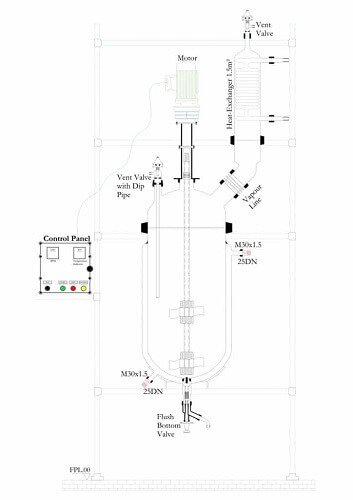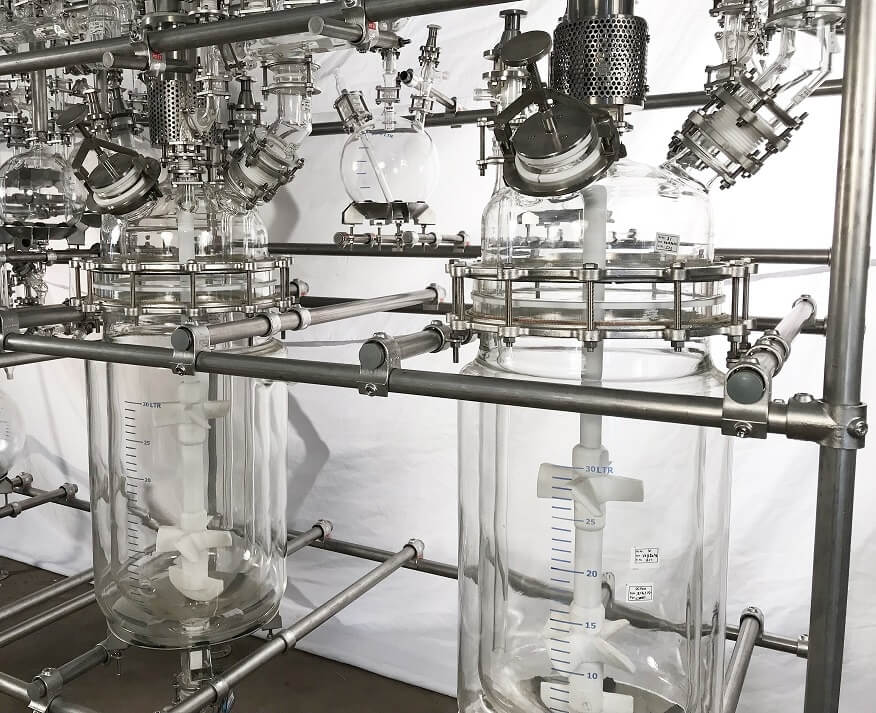Jacketed Glass Reactor
In the pharmaceutical and chemical industries, a Jacketed Reactor is used to control the temperature of its content via a heating or cooling jacket made around the vessel by circulating heating or cooling fluid through the jacket. Agitation is usually used in Jacketed Glass Vessels to improve the level of homogeneity in the properties of fluids such as concentration and temperature.
The essential part of all the chemical processing units is a reactor. Hence it is widely accepted as the ‘heart’ of the processing system because it is considered as the most crucial component in the chemical industry.
A glass reactor made from Borosilicate is known to offer a unique advantage of the visibility of reactions happening inside the reactor, which no reactor made from other materials can give. However, the user’s visibility advantage is compromised when the traditional methods are used to heat the contents inside the glass reactor. This provoked the industrialists to develop the Jacketed Glass Reactor Vessels.
The design of a Jacketed Glass Reactor is made up of a vessel that is bounded by a layer like a jacket made up of glass through which the cooling and heating fluids are passed. The jacket is considered to be an isolated chamber around the vessel inside and is placed in a way that the content present inside of the vessel does not pose a direct contact with the jacket. Concerning various requirements, a nozzle is also provided in the jacket for venting purposes.
Options of Jacketed Glass Reactors
Jacketed Reactors can be customized concerning various options concerning their size and utility.
Below are the options available in Jacketed Glass Reactor Unit:
- Stirrer Drive: Has a non-flameproof or flameproof Motor, Ex-proof, which runs at 250 RPM with the in-built speed regulator.
- Stirrer for Construction material: It is made up of glass or is lined by PTFE, Hastelloy, SS316L.
- Stirrer shape: It comes in a variety of stirrers such as the Glass Impeller Stirrer with an in-built PTFE Blades, a Vortex Stirrer, a propeller stirrer, and an anchor stirrer.
- Stirring Assembly: Stirring Assembly comes with a mechanical or a bellow seal.
- Supporting Structure: Can be made up of Epoxy coated Carbon Steel, Carbon Steel, Stainless Steel with 304 and 316 variants. All these structures can be made available to you in the Trolley mounted form as per your requirements.
- Closing Valve: It is designed to drain or flush the bottom outlet.
Advantages
- Pt100 sensor works accurately in measuring high temperatures and small errors, which will improve the work efficiency and make it better;
- The heating or cooling material poured in the interlayer of the reactor can be released after the completion of the reaction; hence, no liquid gets compiled;
- The overall column made with Stainless Steel frame structure is strong enough to last long. It comes with a five reactor lids, a full set of reflux, external addition of liquid, and a tool to measure the temperature;
- It is built with substantial torque and is absolutely noiseless. AC gear reduction motor made with Japanese technology is endorsed;
- Stirring paddle made up of double-tetrafluoroethylene is specially designed for such glass reactors as they are highly suitable for mixing of any liquid material regardless of low or high viscosity.
Salient Features
- It is built with Borosilicate glass 3.3 and has excellent physical as well as chemical properties.
- It has an inbuilt ATEX Motor, a digital display that shows the mixing speed, a frequency conversion tool, and it is brushless, the mixing system works at a constant rate, it is sparkless, absolutely safe and stable.
- It is manufactured with rugged steel and reinforced PTFE stirrer along with an anchor agitator that favors a variety of material viscosity.
- It has PTFE discharge valves that can discharge or dispose of the materials quickly and thoroughly.
- It is proven to work under pressure as well as in the vacuum conditions, under the vacuum.
- The Ex-proof motors can be attached as an option for 10L, 20L, 30L, 50L, 100L, 150L.
- The whole structure is unique, practical, and beautiful.
Working
- The cooling or heating liquid is injected in the space between the glass walls of the jack and the inner vessel.
- You can now connect a double lined glass reactor with an external cooling or heating equipment.
- Start the agitator so that the heat generated by the agitator can stir the content inside the vessel at the constant speed.
- It is proven to react and stir under the natural pressure as well as the negative pressure while in a sealed reactor.
- The outlet valve can be used to empty the material from the bottom of the reactor. It is quite an easy task to operate the reactor.
- The reactor can ideally be used as an instrument that is meant for conducting the experiments of modern chemistry, Pharmacy, Biochemical tests, and the advanced synthetic.
Jacketed Glass Vessels can be used in which industries?
Jacketed Glass Vessels are the most common equipment to be used in industries such as petrochemical, pesticide, rubber, pharmaceutical, dye, and also some industries use the Jacketed reactors to complete the process of sulfonation, hydrogenation, nitration, polymerization, alkylation, condensation, and many other means as well.
Looking for Best Manufacturer of Glass Pilot Plants & Turnkey Projects?


